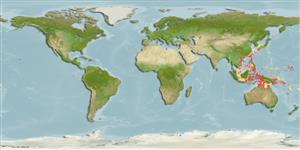>
Gobiiformes (Gobies) >
Gobiidae (Gobies) > Gobiinae
Etymology: Asterropteryx: Greek, a = with + Greek, sterros, -a, -on = consistent + Greek, pteryx = fin (Ref. 45335); ovata: Name from Latin 'ovata' meaning egg-shaped, refers from the large ovoid black spot on the base of caudal fin..
Environment: milieu / climate zone / depth range / distribution range
Ecología
marino demersal; rango de profundidad 15 - 40 m (Ref. 75136). Tropical
Western Pacific: Sulawesi (Indonesia) and Ponape (Caroline Islands), including Japanese waters; probably more widely distributed in the area and the Indian Ocean.
Tamaño / Peso / Age
Maturity: Lm ? range ? - ? cm
Max length : 2.7 cm SL macho / no sexado; (Ref. 75136)
Short description
Claves de identificación | Morfología | Morfometría
Espinas dorsales (total) : 7; Radios blandos dorsales (total) : 9 - 10; Espinas anales: 1; Radios blandos anales: 8 - 9. This species differs from the other species of the spinosa complex in having the following set of characters: cheek spines 3-6; largest cheek spine slender obviously longer than other spines, length 2.6-6.3% SL; a pupil- or eyesized ovoid black spot on base of caudal fin (extending anteriorly to third mid-lateral scale before posterior margin of hypural); head, body and dorsal fins when alive or fresh has numerous orange speckles; first dorsal fin with no distinct black spot (Ref. 75136); characterized further by having prolonged fourth dorsal spine, forms long filament in adult; longitudinal scale series 22-24; ctenoid predorsal and body scales; cycloid scales in cheek, opercle, pectoral-fin base and prepelvic area; rounded caudal fin; depth of body 3.2-3.7 in SL (Ref. 90102).
Occurs in coral-reef slopes in the protected bays, found solitary on muddy or sandy-mud bottoms with dead-coral rubbles under the heavy growth of corals (Ref. 75136).
Life cycle and mating behavior
Maturities | Reproducción | Spawnings | Egg(s) | Fecundities | Larva
Shibukawa, K. and T. Suzuki, 2007. Two new species of the cheek-spine goby genus Asterropteryx (Perciformes: Goiidae: Gobiinae) from the western Pacific. Bull. Natl. Mus. Nat. Sci., Ser. A, Suppl 1:109-121. (Ref. 75136)
IUCN Red List Status (Ref. 130435)
Threat to humans
Harmless
Human uses
Herramientas
Special reports
Download XML
Fuentes de Internet
Estimates based on models
Preferred temperature (Ref.
123201): 25.3 - 29, mean 28.2 °C (based on 54 cells).
Phylogenetic diversity index (Ref.
82804): PD
50 = 0.5039 [Uniqueness, from 0.5 = low to 2.0 = high].
Bayesian length-weight: a=0.00708 (0.00333 - 0.01504), b=3.09 (2.92 - 3.26), in cm total length, based on LWR estimates for this (Sub)family-body shape (Ref.
93245).
Nivel trófico (Ref.
69278): 3.3 ±0.4 se; based on size and trophs of closest relatives
Resiliencia (Ref.
120179): Alto, población duplicada en un tiempo mínimo inferior a 15 meses (Preliminary K or Fecundity.).
Fishing Vulnerability (Ref.
59153): Low vulnerability (10 of 100).
